Keyword research is such an exciting part because it’s where you start your content journey, and it’s super important to target the right keywords at the right times of your content creation journey.
If you choose too competitive keywords, you’ll never get any traffic, but if you’re an established website and choose keywords with low search volume, you might be wasting your time.
I reviewed LowFruits to help you with these cases. Let’s get into it.
Key Takeaways
- Enter your seed keyword and get thousands of profitable keywords.
- Use the extractor and extract long-tail keywords from low-domain rating domains.
- Run keyword reports and get an overview of what keywords to pursue on your website.
Pros And Cons Using LowFruits
After using LowFruits for a couple of weeks, there is no doubt that I’ll continue to use it. There are so many great keywords based on the autosuggest feature. But here are my pros and cons.
Pros Using LowFruits
- The in-depth analysis of the keywords is super impressive.
- You can get keyword ideas from competitors with low domain ratings.
- The use of autosuggest brings keyword ideas you would've never thought of.
Cons Using LowFruits
- You have to spend 1 credit per keyword you want to analyse.
- When you extract keywords from a competitor, there is no way to filter through them.
LowFruits
My Quick Take
LowFruit is the most extensive keyword research tool I’ve ever tried, and I’ve tried a lot.
The fact that you get low-competition keywords with so little effort amazes me. This is incredible.
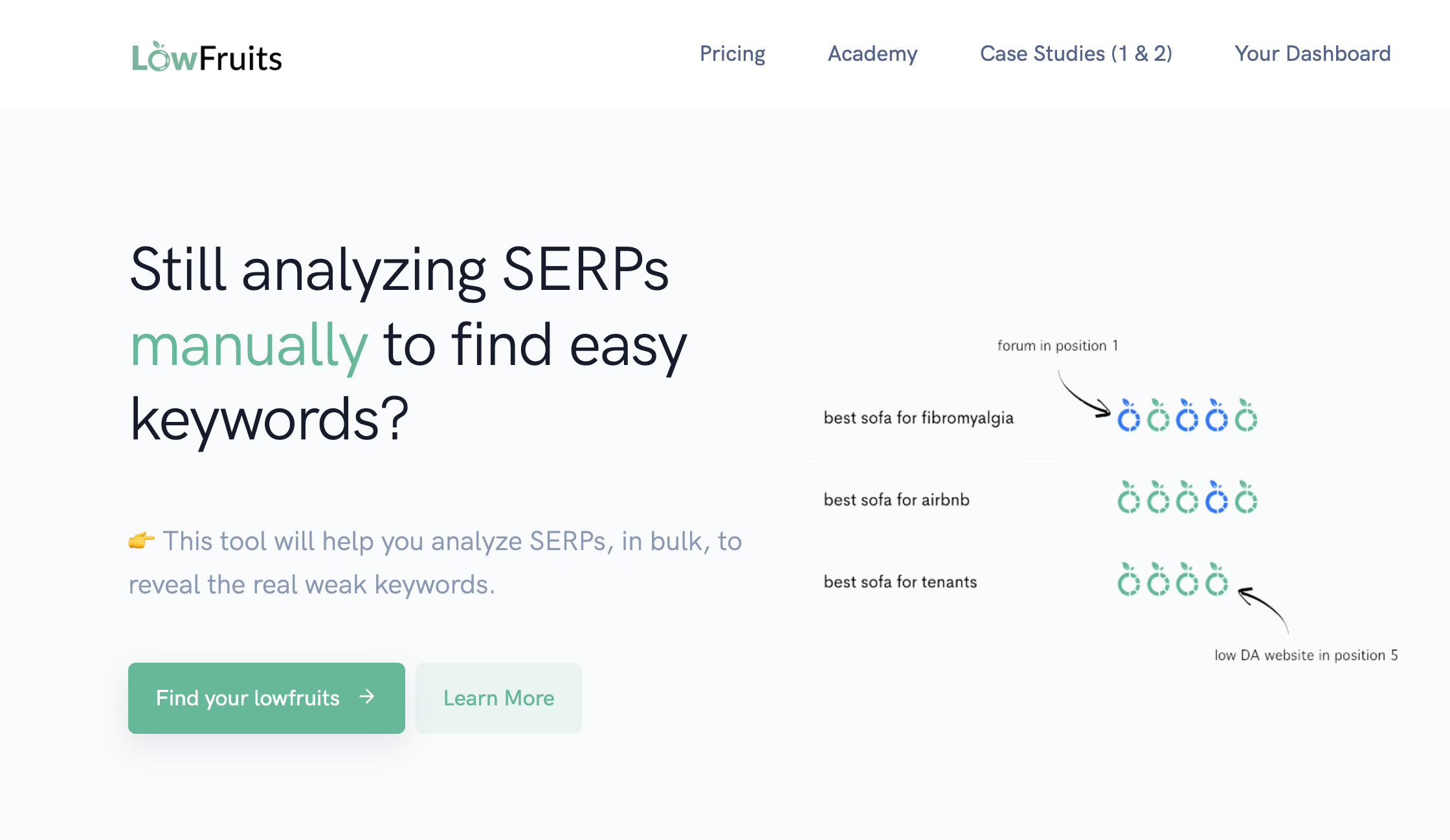
What Is LowFruits?
LowFruits is a way to do keyword research using autosuggest from Google.
Normally you would enter your seed keyword, and then the keyword research tool would provide a list of keywords based on its own database of keywords.
But when everyone has access to that library, it’s limited how you can find new keywords and especially low-competition keywords.
LowFruits works in a way that it uses autosuggest from Google based on your seed keyword, and then it finds related keywords, and people also ask questions.
All this gives you a long list of long-tail keywords you can start to target, filter and work with.
It’s so far the best keyword research tool I’ve tried, with the in-depth analysis and the longtail keyword ideas it brings.
Get actionable SEO tips in your inbox
Join 900+ other website owners to receive a weekly SEO video from my YouTube channel, which I’ll share.
And on top of that, an actionable SEO tip every week.
LowFruits Keyword Research Features
Now let’s get into the exciting part, the features.
LowFruits is so good at utilising search engines to show you relevant keywords you can then filter on and much more. Let’s get into my thoughts on LowFruits, and its features.
Keyword Research Reports

Now the report module is where the magic really is with LowFruits, and this is where you analyse all your keywords.
Here you get an overview of all your keywords, but until you analyse them then, you can only see the keyword, and that’s it.
Once you analyse a keyword, which costs one credit, then you can see the following:
- The keyword
- The SERP
- Search volume
- If there is a featured snippet
- Average word count
- Weak spots
- Position of your website, if it’s appearing
- CPC
So you get a ton of information on each keyword, and the weak spots is my favourite.
Here you get an analysis of the keyword in which it looks for low domain-rating domains, and the more it finds, the bigger your opportunity is.
So you really want to see as many LowFruit logos as possible, as it indicates there is a big opportunity for you to write an article.
Remember: The search volume is an estimate. Use your own experience to define whether the keyword is worth pursuing or not.
Report filtering
Another thing I really like about the report module is the filtering options. Here you can filter on:
- Topics
- Search Intent
- Status (Analysed / Not analysed)
- Include words
- Exclude words
- Average word count
- Search volume
- CPC
- Weak Spots
- If there are any forums in the SERP
- Title match
- Search Signals
- Number of words
- If your website appears in the top 100 or top 10
- Other
- Featured snippet
- No featured snippet
- In a cluster
- Not in a cluster
- Custom weak websites
So as you can probably feel now, you can really narrow your search, and that’s what we want to find just the right keywords.
Report modules
Not only can you see keywords, but you can also see questions, related searches, and so much more.
All this you get in a report when you run it on a seed keyword.
Here is a quick overview:
- Keywords
- Suggestions
- Questions
- Hidden
- Clusters
- Competitors
So not only do you get the keywords, you get so much more information and data to analyse, and that’s what I enjoy about LowFruits, the depth of data is incredible.
Keyword Finder Via Google Autosuggest
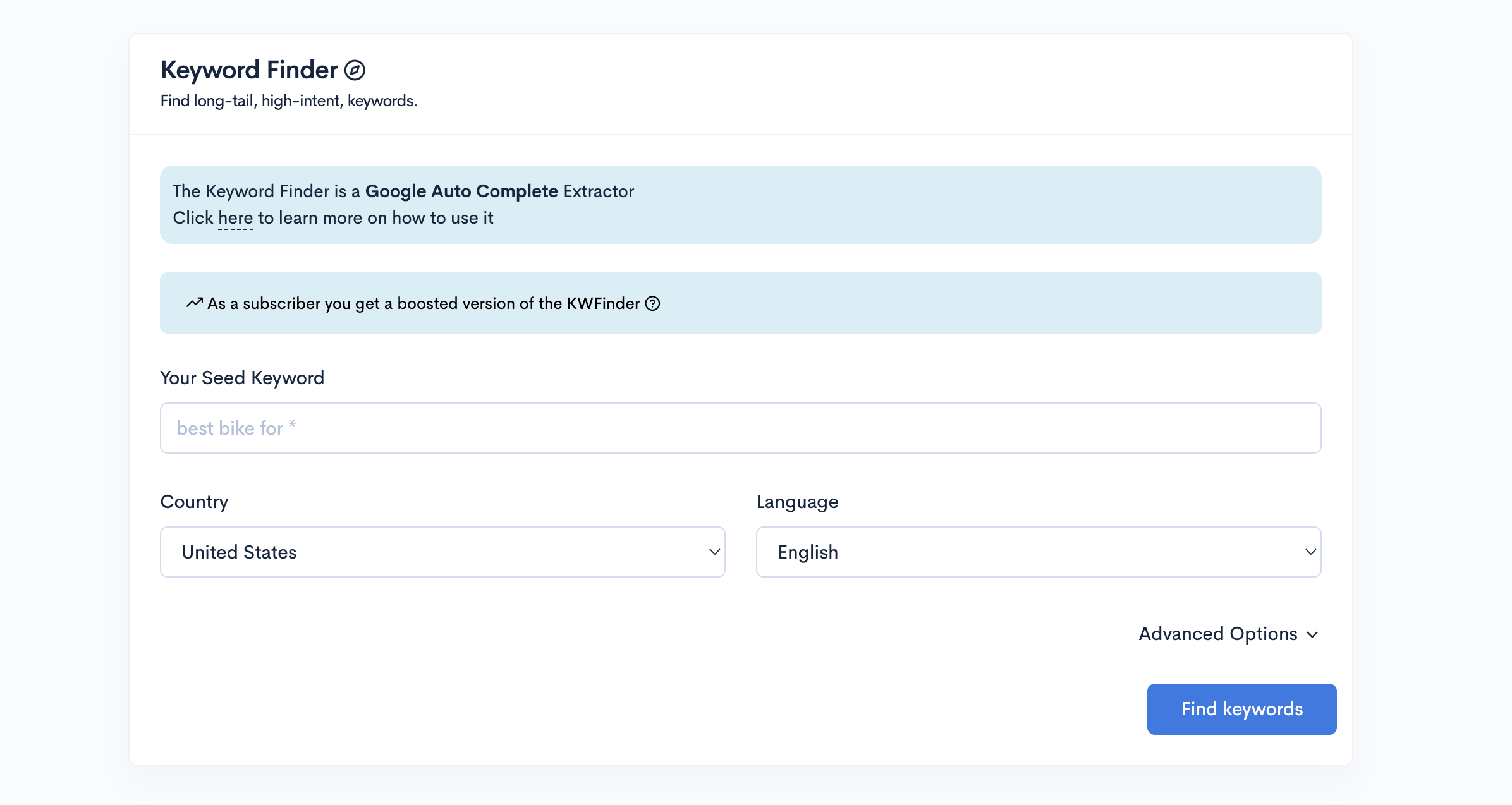
The keyword finder is where I usually start my journey, and you can use this super simple, but you can also turn on advanced mode and get into the nitty-gritty. Let me show you.
When you use it simply, then you just enter your seed keyword and choose the country you’re targeting and your language. That’s one way of doing it, and then you’ll get a bunch of keywords in the reports.
In simple mode, you can also use a better way of searching for keywords. You can use the wildcard operator for where you want the autosuggest to fill out keywords. Here are some examples:
- Best keyword tools for *
- Best * for freelancers
- How to * as a content creator
Then you can use the comparison method as well, where you compare 2 elements to each other. Here are some examples:
- Ahrefs / semrush
- Apple / Samsung
- real Madrid / Barcelona
You can also use double quotes when you want a specific word to be represented in all keyword suggestions.
Here are some examples:
- Best “keyword research” tools
- Best “shoes” for runners above 40
- Must have kitchen appliances for “cake baking”
These small tips make it easier for you to expand your search for keywords, and you get much better results in the end.
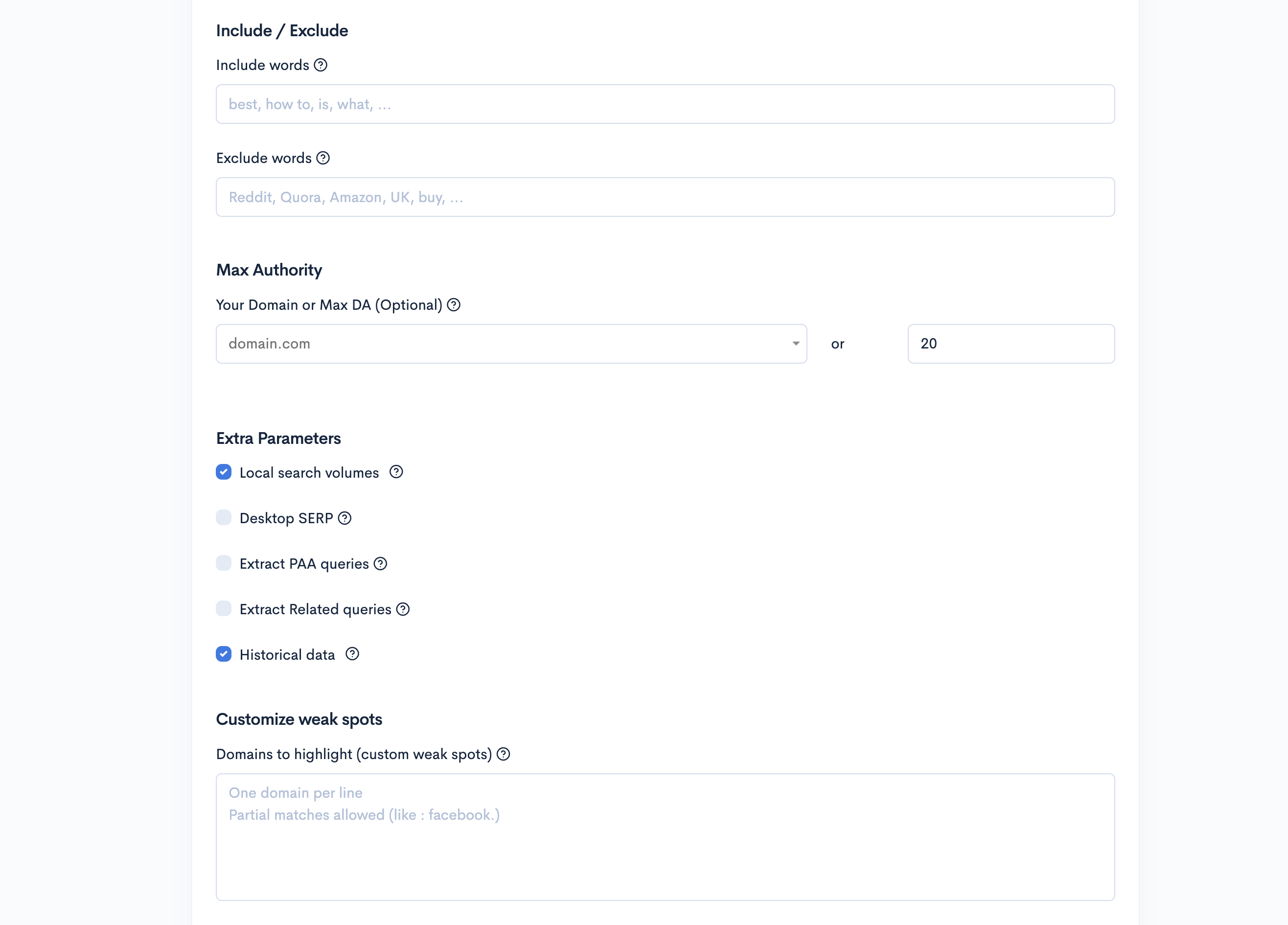
You can also enable advanced mode, and here you can include and exclude words. You can set a max authority which is great if you want to find low-competition keywords.
And then, you have a set of extra parameters where you can ensure it has local search volumes if you want more data, such as people also asking questions, related queries and more.
Lastly, you can customise the weak spots, where you can highlight whenever a specific domain appears in the top 10.
All these filters make it so much easier to create an in-depth analysis of your keyword research.
Import Your Own Keywords
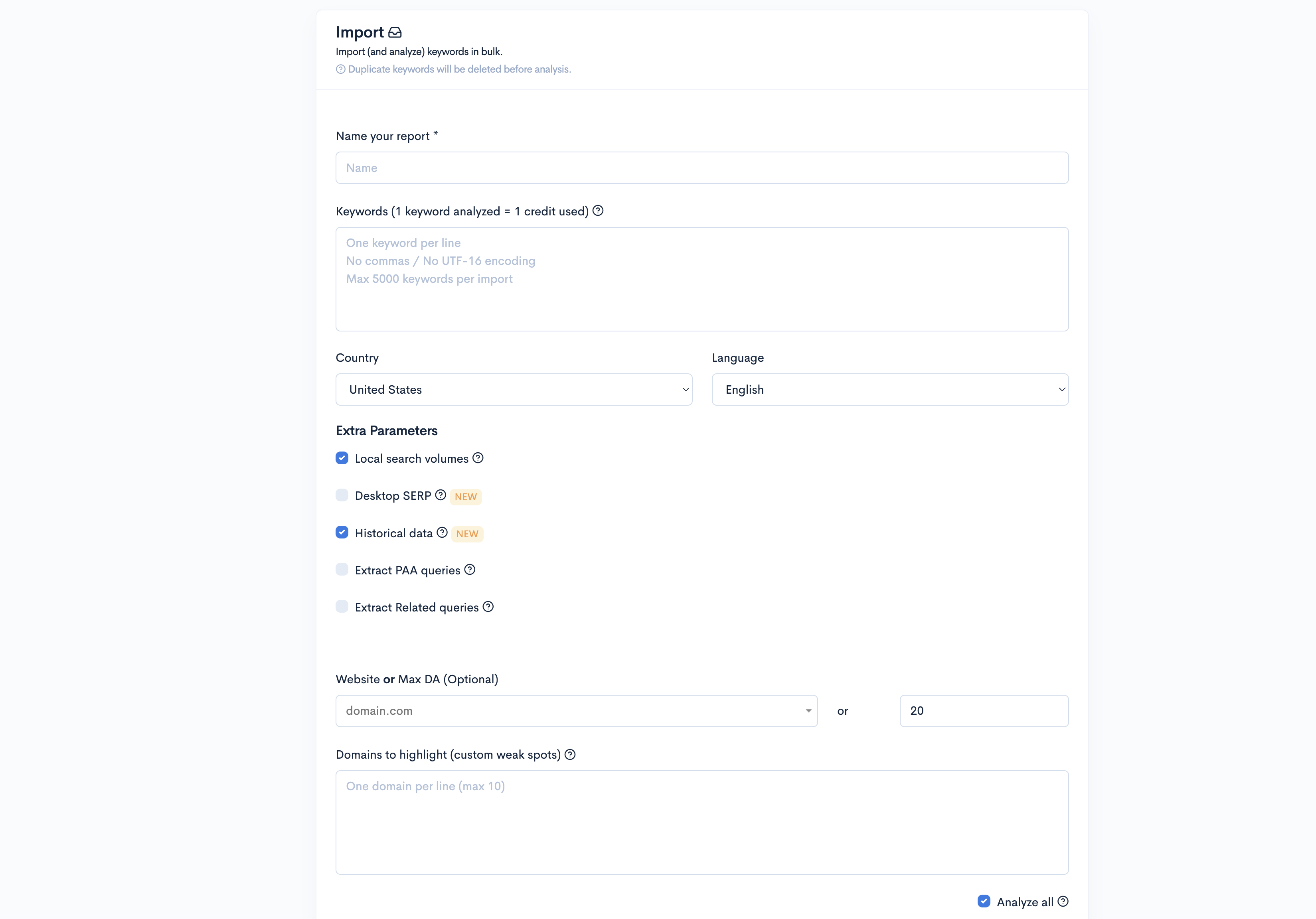
If you have a long list of keywords you want to analyse through LowFruits, then this is also possible.
You might have the keywords from another tool, or you just have a great sense of idea about what keywords are relevant for your niche to write blog posts for.
I had a list of keywords after I reviewed RankIQ, and I ran them through LowFruits, and it works perfectly, but the only caveat is that it costs 1 credit per keyword, so ensure you only analyse the relevant keywords you want to pursue.
When you import your keywords, you can choose to analyse all keywords from the beginning, or expand your analysis with historical data, people also as queries and even related queries.
And as soon as you’ve run the report, then you can start to filter and analyse your keywords.
I really like this theme from LowFruits. You get so much extra data and functionality, even when you’re just analysing your own keywords.
It’s one of 3 ways of creating a report, and the 2 other ways are through the keyword finder and the extraction method.
As we’ve already discussed the keyword finder method, let’s move on to the extraction method.
Find Weak Domain Keywords
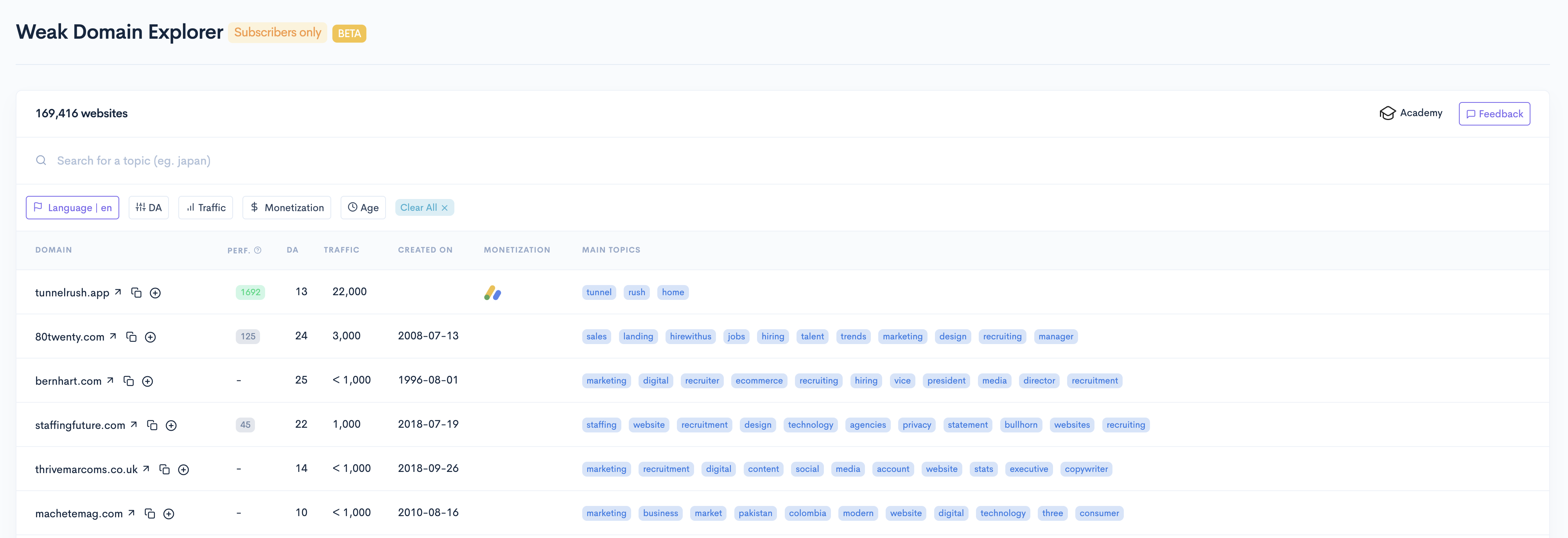
This is such an awesome and unique feature with LowFruits.
LowFruits has created a library of low domain-rating domains, and they have categorised them. So you can search for your seed keyword and then find all the domains relevant to your case.
Then you can click on the plus and extract keywords from them, which I’ll discuss in the next step.
What’s really cool about this module that I like is that you search a library of only low domain-rating domains, meaning all the keywords are often relevant for you to rank for.
Another thing I really like is how they have categorised them, and you can see elements such as:
- The domain name
- Performance score
- Domain rating
- Estimated traffic
- Domain age
- Monetisation method
- Main topics
All this quickly gives you an idea of whether the domain’s keywords are worth pursuing.
And once you’ve added the domains to the list you want to extract keywords from, it’s time to analyse.
Extract Keywords From Low Domain Rating Domains
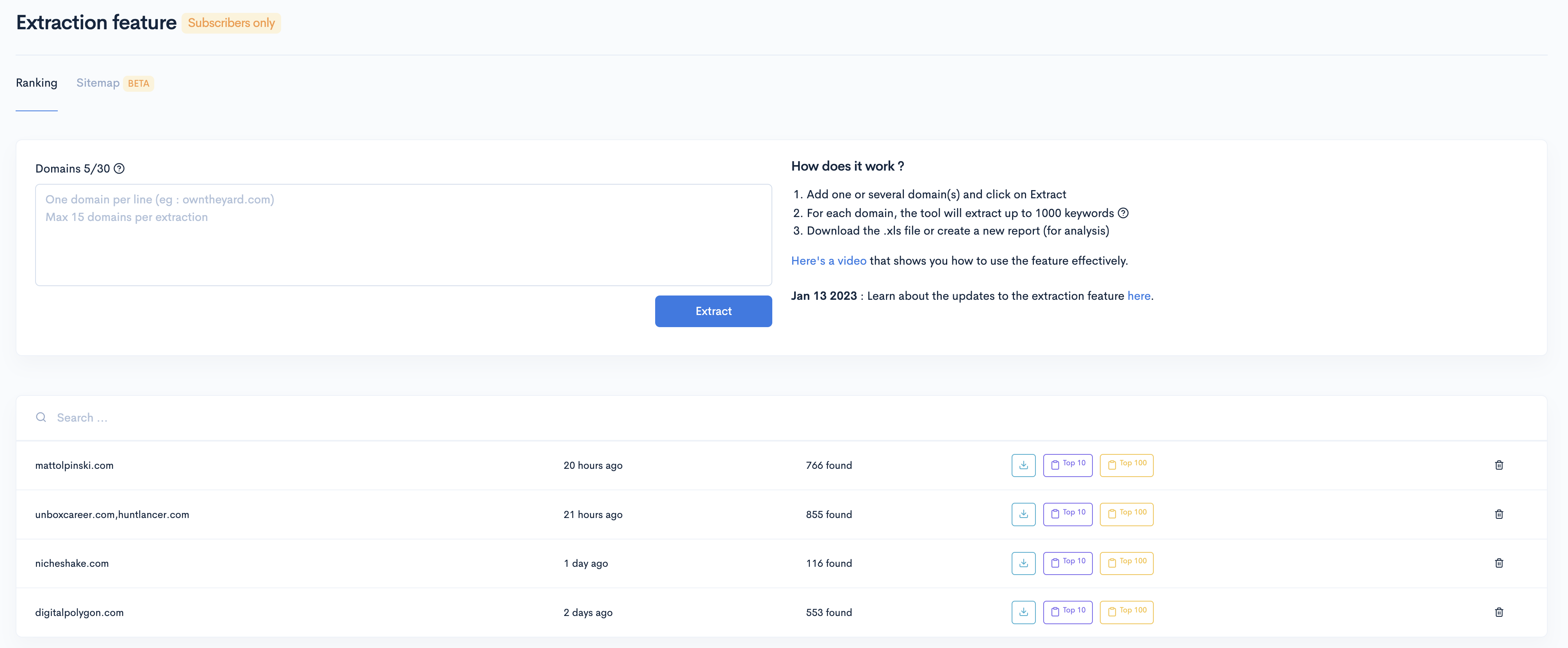
Here you can enter your domain, and then LowFruits will pull out all the keywords they can see they’re ranking for.
You can then analyse either top 100 or top 10 keywords and create a report.
You can also export all the keywords and import all of them via the import module if you wish to.
One thing I noticed here is that you can’t really filter the keywords until you run the report, unless you do it manually.
So you’ll have a long list of keywords all mixed together without knowing which are relevant and which are not.
I’ll recommend you manually remove all the keywords that are not relevant to you so they’re not part of your report.
Other than that, then it’s a super awesome tool to get some keyword ideas from competitors.
Create Keyword Lists To Master Topical Authority
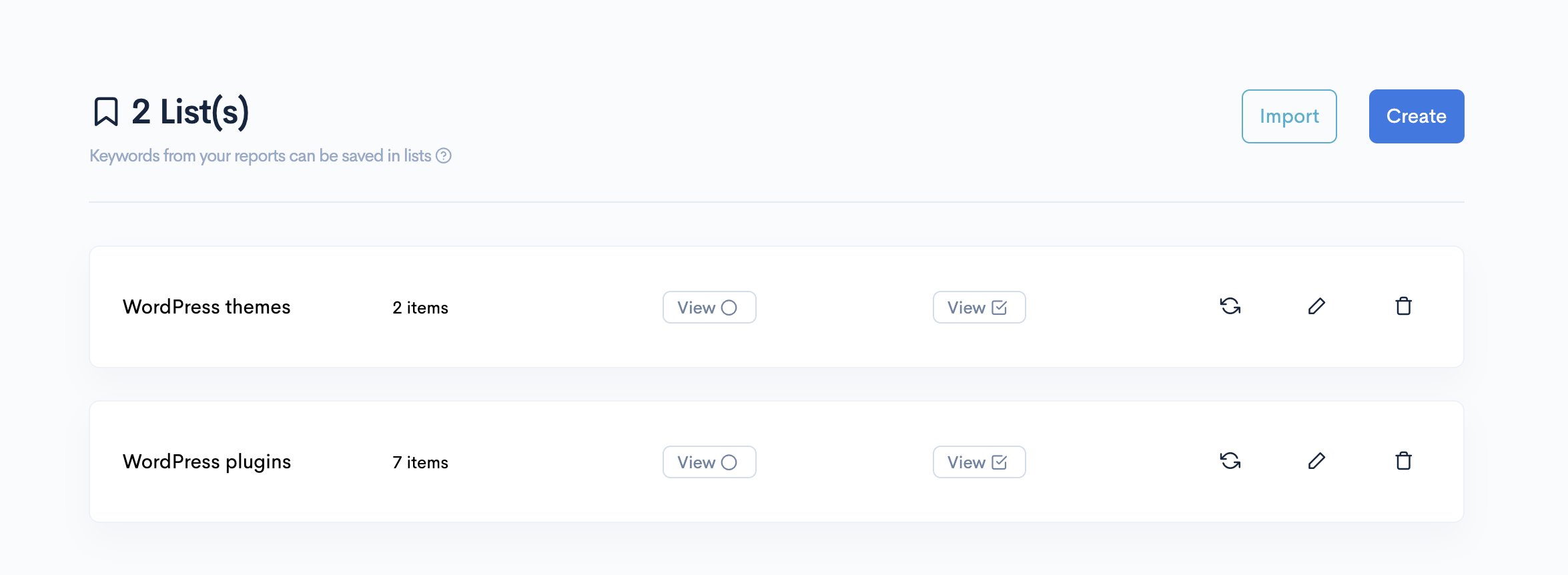
This is such an underrated feature, and for many, it’s just a simple feature, and it is. But when used right, it brings so much more value.
When I use LowFruits, I like to use keyword lists to achieve topical authority.
So one thing is that I create all the reports, and I then find relevant keywords in the reports and add them to the different lists.
Once I’ve written an article for all the lists, then I know I’ve achieved topical authority in that topic, and then I can move on to another list.
And if, at some point, I see a keyword fitting in a list I’ve already written content for, then I just get another chance to create content. I think that’s so awesome.
Pro-tip: Create a list for each of your topics within your niche, and then start to fill out keywords every time you see them. At some point, you’ll achieve topical authority, and your traffic will explode after a Google Core Update.
Who Should Use LowFruits?
LowFruits is a super simple keyword research tool for anyone seeking to expand their SEO efforts to grow more organic traffic to their website.
If that sounds like you, then I’ll strongly recommend you test it out. It’s an awesome keyword research tool, and so far the best I’ve tried.
It simplifies the process of uncovering low-competition keywords in your niche, which makes it perfect if you’re an individual managing your own blog or working in a team where you need to expand your SEO content.
LowFruits Pricing

I really like the LowFruits pricing system. They offer both a credit-based system and a monthly subscription option, and this allows users to choose the payment approach that best suits their specific needs and usage patterns.
If you go with the credits system, unused credits can be saved and carried forward to subsequent months. This provides flexibility for you if you’re not using all your credits in a particular month but want to make use of them at a later time.
The Credit-Based System is priced at:
- $25 per month for 2,000 credits
- $60 per month for 5,000 credits
- $100 per month for 10,000 credits
- $250 per month for 50,000 credits
A Monthly Subscription is priced at:
- Standard: $29 per month, providing 3,000 credits monthly
- Premium: $79 per month, providing 10,000 credits monthly
Yearly Billing (with monthly credits):
- $249 a year for 3,000 credits per month
- $749 a year for 10,000 credits per month
Be aware that if you sign up for the subscription, you do get access to many great features you don’t get if you’re only buying the credits.
These features are:
- Boosted keyword finder
- Domain Explorer
- Extract competitors
- keywords
- Extract sitemaps
- Top Performers
- 10% discount on PAYG
This dual approach makes LowFruits accessible for you both if you want to use it only with credits or if you want full access to the subscription plan.
How Is LowFruits Support?
Unlike some of LowFruit’s competitors, LowFruits offers both Live chat Support and a welcome academy with a detailed walkthrough of LowFruits features.
The live chat allows for real-time communication with support representatives, offering immediate assistance.
LowFruits.io also has an array of support articles covering a wide range of common issues that users may face while using the software.
Overall, based on my own testing after using LowFruits, their support is great. I needed help once, and I got an answer immediately.
So, even though LowFruits is super simple to use, don’t be afraid of asking for help. The LowFruits staff are super helpful.
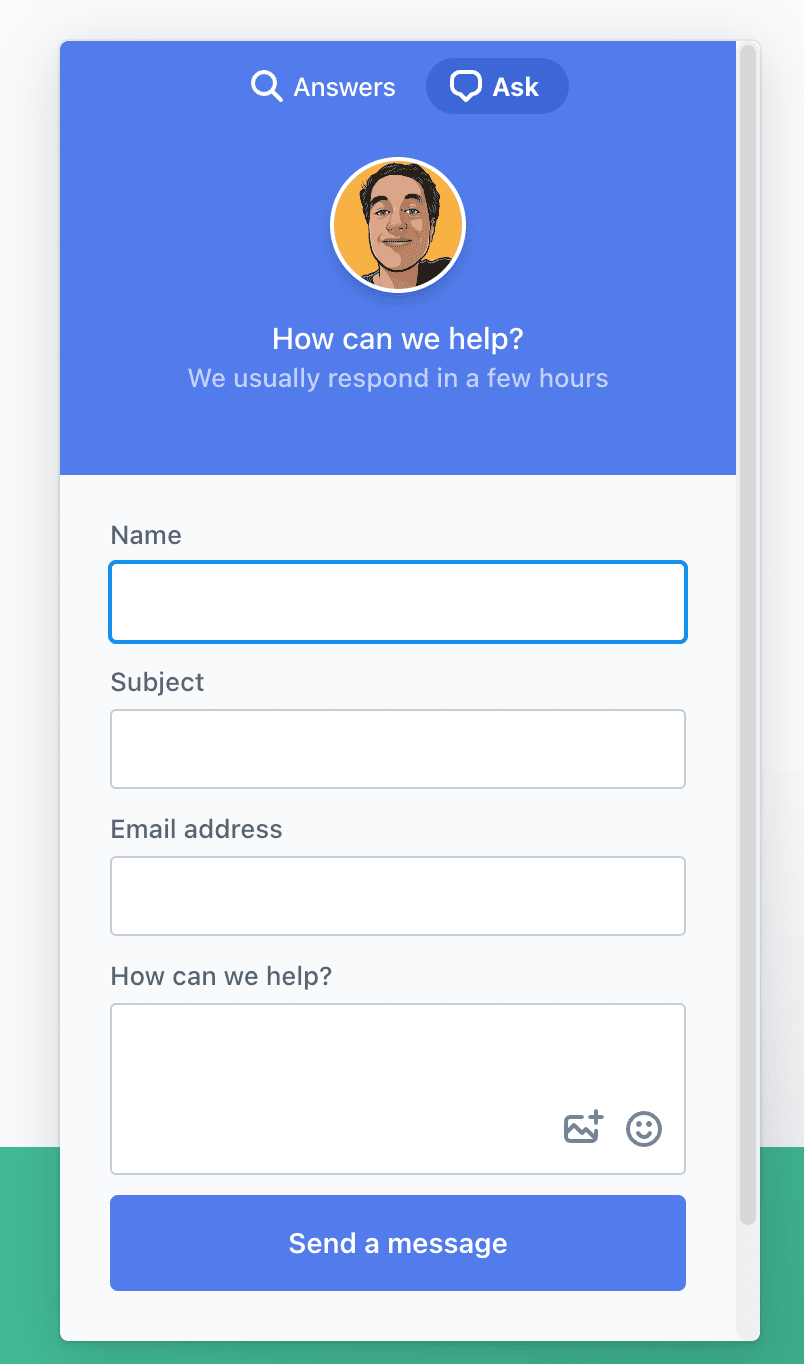
Alternatives To LowFruits
LowFruits is unique in 2 ways:
- The way it showcases keywords from Google Autosuggest.
- Their library of low domain rating keywords.
Not many keyword research tools come close, but here are 2 I’ll say are up there.
Keyword Chef
Keyword Chef is similar to LowFruits as they both use Google autosuggest to find relevant keywords.
Keyword Chef also has a niche insight module that you can use to find lucrative niches and start your research for your own niche.

RankIQ
Just like LowFruits, RankIQ has a unique approach to keyword research.
Instead of using the traditional way, they have a library of multiple niches filled with keywords manually vetted by SEO experts. It’s super interesting.

Wrap-Up: Is LowFruits Worth It?
I can only speak based on my own experience, and yes LowFruits is worth it. You get so much data and keyword ideas from this simple-to-use keyword tool.
And based on all the keywords, you can then start to filter on negative keywords, search volume and much more.
All the options just make it so much worth it, also because they’re taking a different approach than the average keyword research tools that just use libraries of keywords.
So if you’re looking for a tool that will show you low-competition keywords based on domain authority, organic traffic, and more. Then LowFruits is for you as well.
I’m still using LowFruits today and benefitting from its many features.
LowFruits
My Last Thoughts

LowFruits: Frequently Asked Questions
You can find answers to most questions in the Help Academy. Some of the most common questions include:
Is LowFruits Beginner Friendly?
Based on my experience, LowFruits is easy to use and accessible for bloggers at all skill levels, whether you’re a beginner or a more experienced blogging expert.
How Does LowFruits Find Long-Tail Keyword Ideas?
LowFruits leverages Google’s Auto Suggest API, along with undisclosed additional Google sources, to enhance its keyword generation capabilities by utilising over 150-word modifiers like “How to,” “Why,” “Best,” “Vs,” “What,” “When,” and more, LowFruits is able to create a vast array of potential keywords.
LowFruits

Keyword research can be done in so many ways, but LowFruits uses Google Autosuggest to find long-tail keywords that are easy to rank for.
4.5
Pros
- The in-depth analysis of the keywords is super impressive.
- You can get keyword ideas from competitors with low domain ratings.
- The use of autosuggest brings keyword ideas you would've never thought of.
Cons
- You have to spend 1 credit per keyword you want to analyse.
- When you extract keywords from a competitor, there is no way to filter through them.


